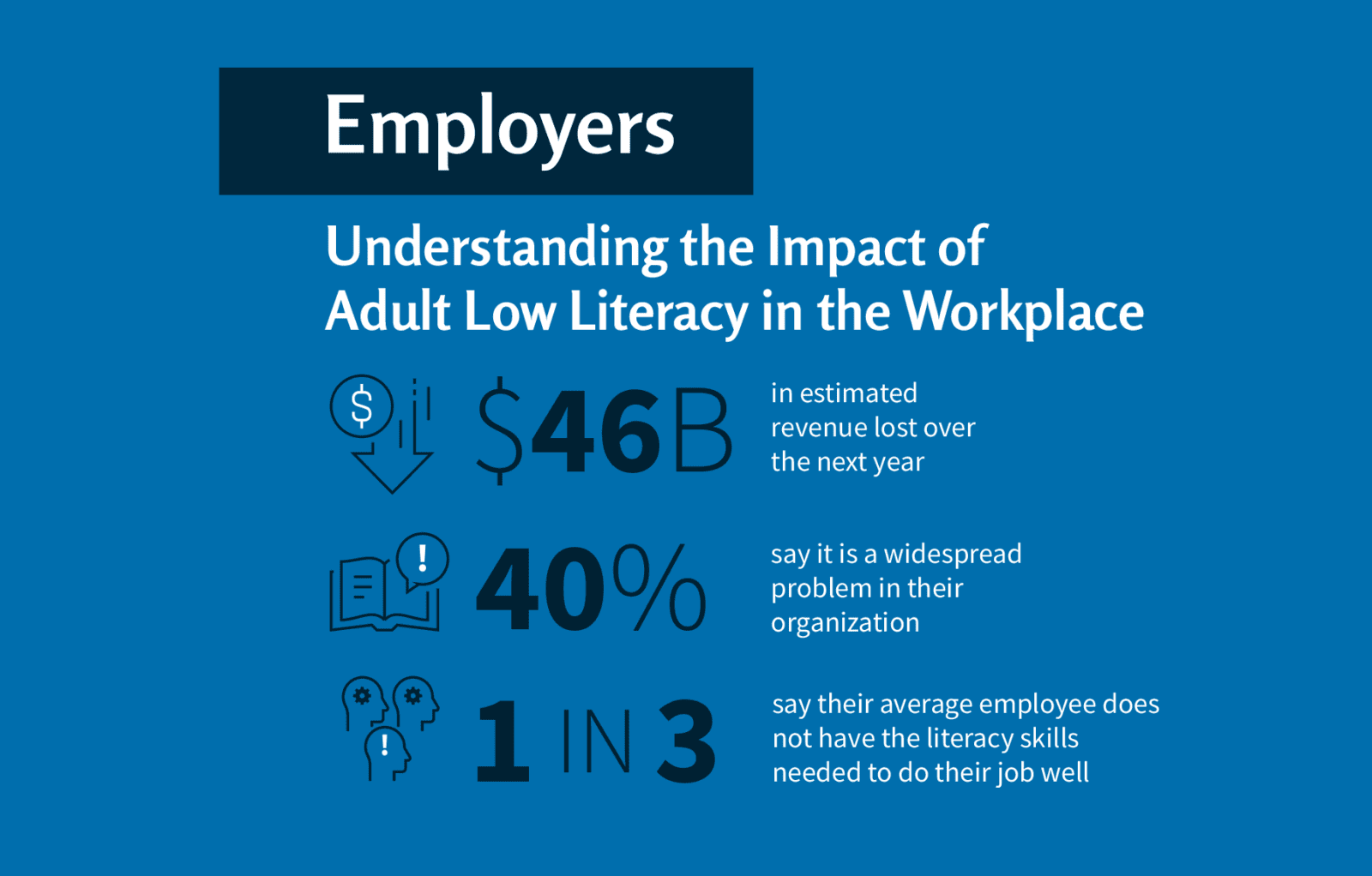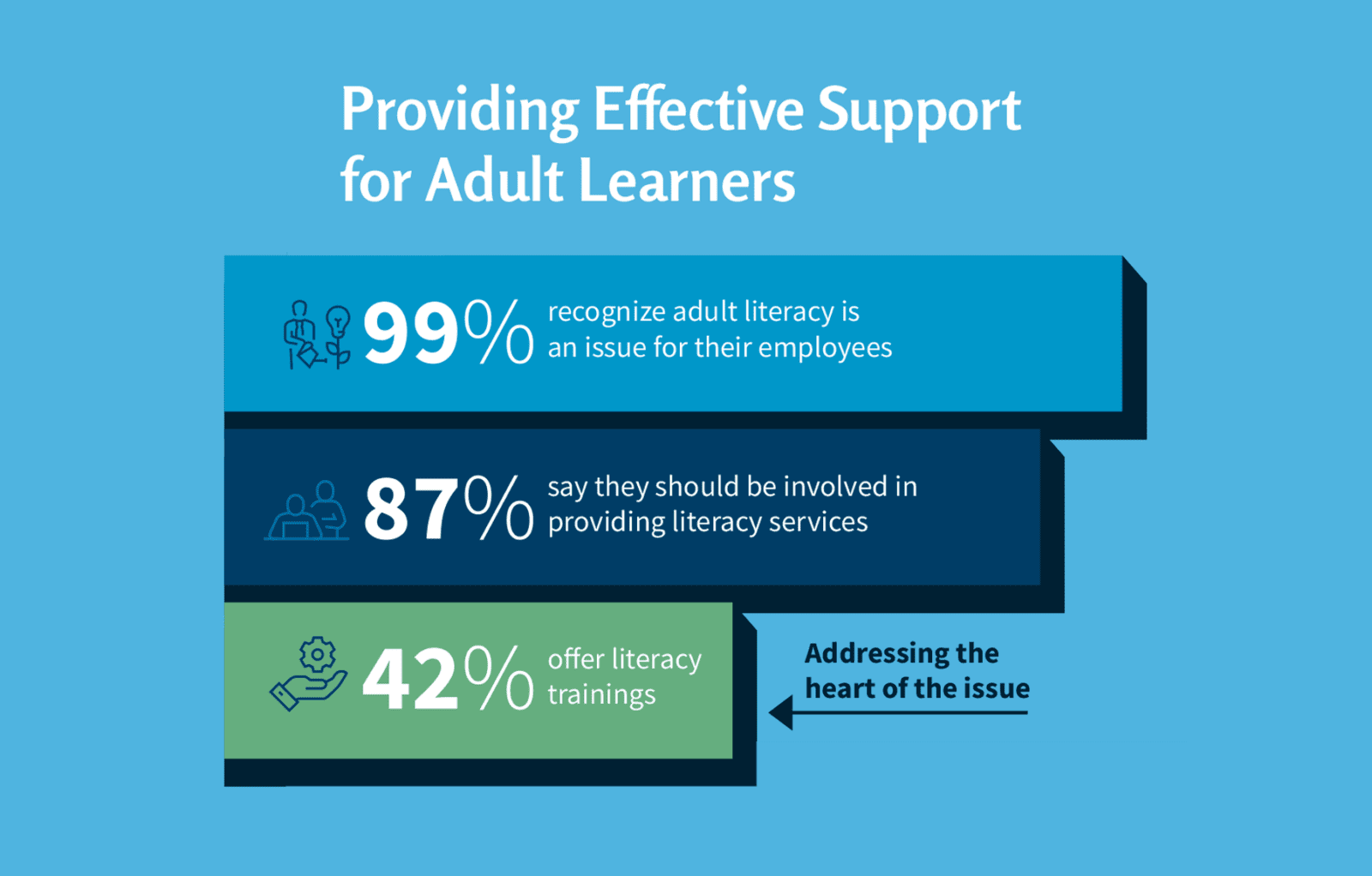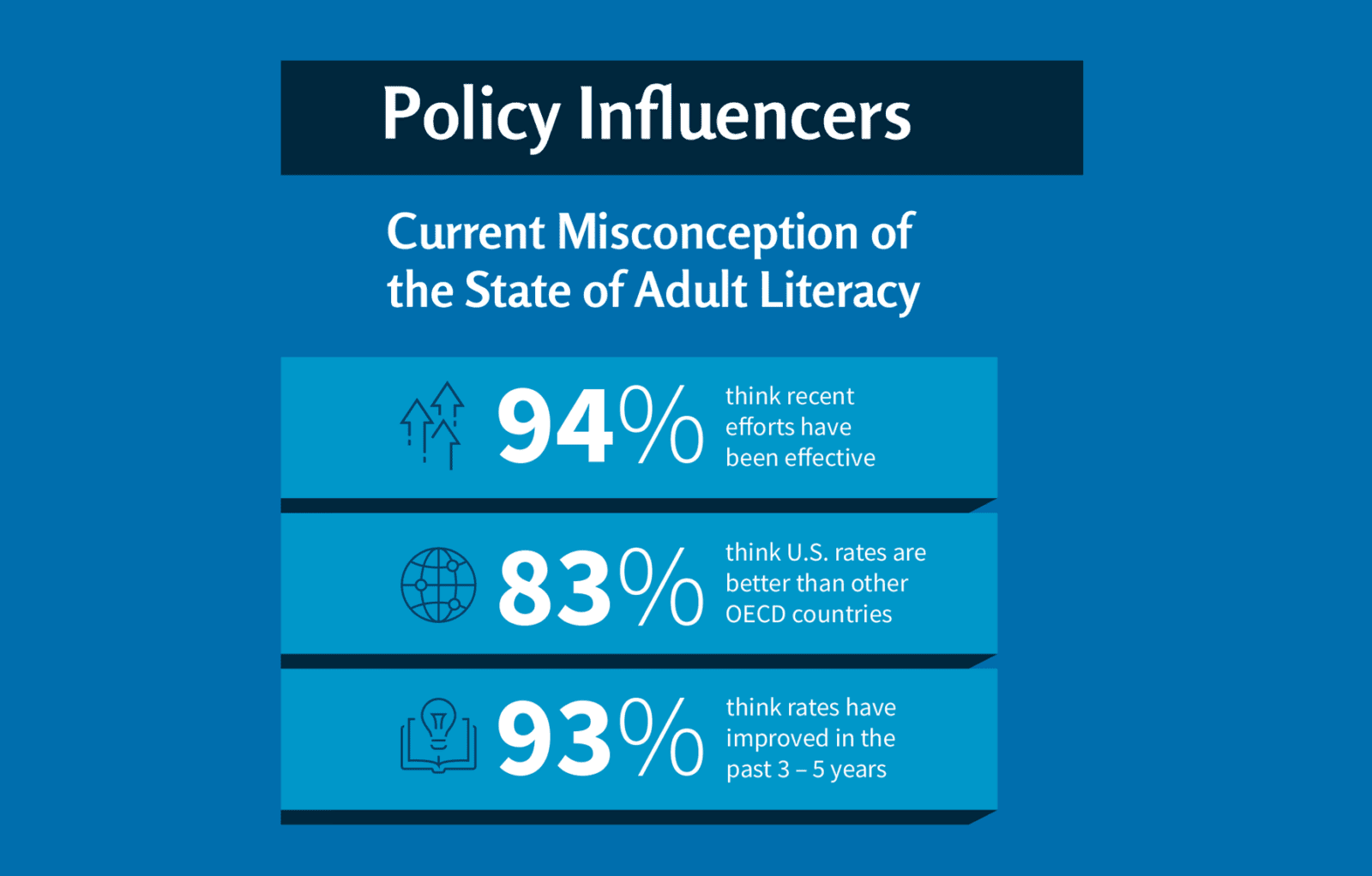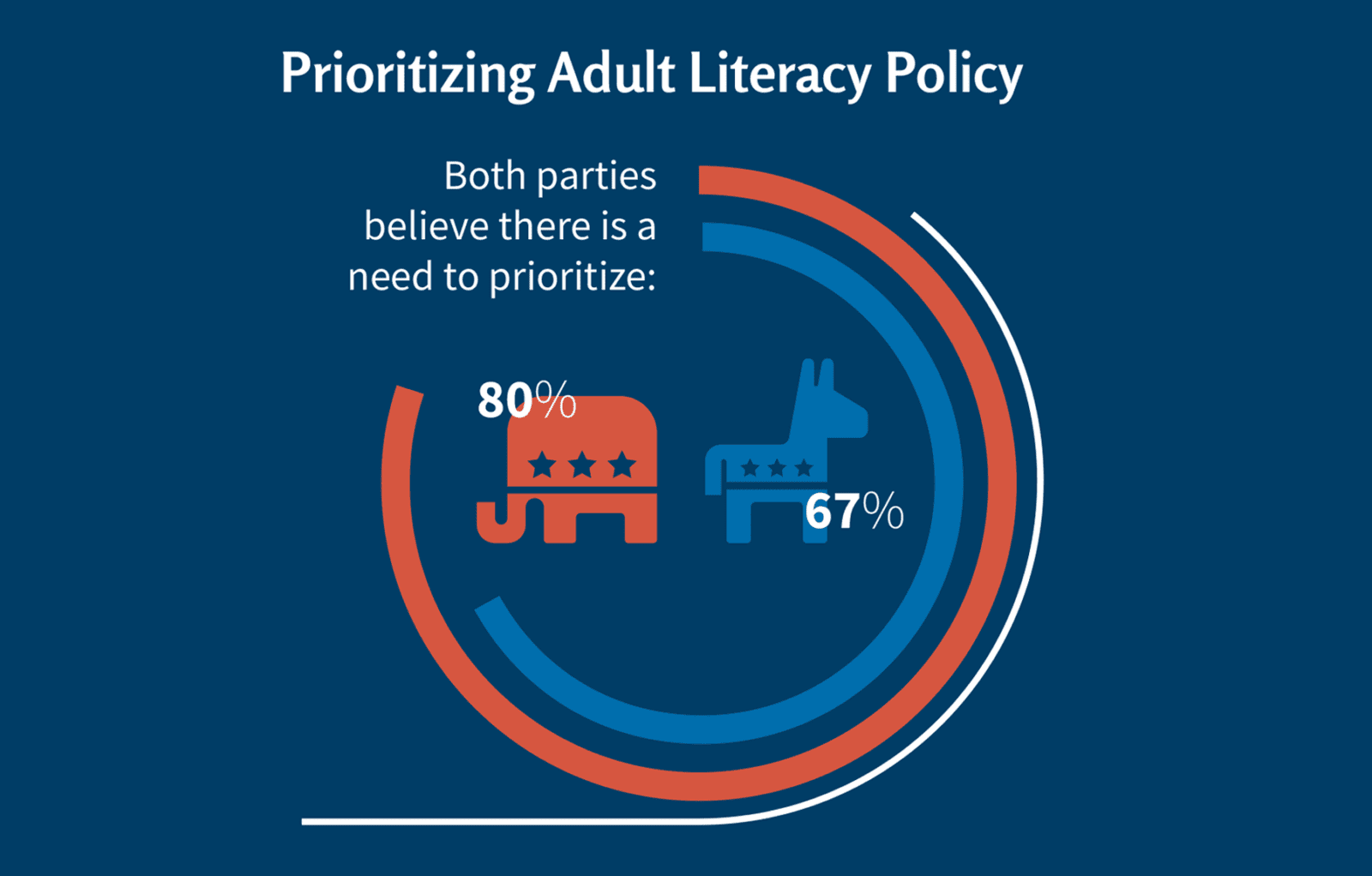
Advancing Adult Literacy: Mobilizing Business & the Beltway
Access the Literacy Landscape in Business & the Beltway infographic here.
Of all adults in the United States, more than half (54%) read below a sixth-grade literacy level and nearly one in five (about 43 million Americans) read below the third-grade level, which means they can do no more than read simple, short texts when locating information.[1] As shocking as that may appear, it’s compounded by the fact that fewer than 10 percent of adults in need of literacy skills support are currently receiving services.[2] Against this backdrop, employers and policy influencers still vastly underestimate the scale and scope of the issue, despite either experiencing or knowing others who have experienced this challenge themselves.[3]
Access the full survey reports here.
To explore the potential disconnect between the reality of adult literacy in the U.S. and the conceptions of both business and the Beltway, the Adult Literacy and Learning Impact Network (ALL IN) worked with FTI Consulting to conduct a survey of 500 employers across the United States and 200 policy influencers in Washington, D.C. to quantify the scale of the challenge and identify possible solutions. Importantly, the voices and experiences of learners are essential in any research on adult literacy. To incorporate their perspectives and connect with their lived experience, FTI also conducted a focus group with adult learners and a series of in-depth interviews with adult educators and experts from the field.
This research sheds light on how American business is navigating the challenge of low adult literacy and demonstrates that employers are mostly using workarounds to mitigate the impact of low literacy among their employees, rather than directly addressing it. The research makes it abundantly clear that low literacy is not merely a social concern, but also one with vast implications for business and the economy, as well as health, community safety, and educational attainment more broadly. Employers surveyed estimate that they will lose $46 billion[4] in revenue over the next year as a direct result of low literacy among their employees – an estimate that is realistically far lower than the actual impact because of employers’ propensity to underestimate the scale of low literacy.
Inside the Beltway, policy influencers are similarly seeing a rosier picture of adult literacy than is warranted. Policy influencers seem to be buoyed by a false optimism, reporting that current efforts around low literacy are working and that the U.S. is performing better than fellow OECD countries.[5] Unfortunately, that is not the case. Furthermore, improving adult literacy is perceived to compete with other policy priorities like addressing workforce shortages or national security issues, when it actually complements them.
1 in 3 employers say that their average employee does not have the literacy skills needed to do their job well, and 2 in 5 say that low literacy is widespread in their company.

Among literacy-related skills, businesses across industries most often see their employees struggle with using digital tools. Experts in adult education and workforce training confirm this finding, frequently pointing to the difficulty that those with low literacy have in navigating the ubiquitous technology of the modern workplace. Other common challenges for employees with low literacy include completing administrative tasks, managing day-to-day operations, and putting training and development programs into practice. Each of these struggles could be significantly alleviated through evidence-based literacy skills trainings, such as providing explicit vocabulary instruction or guided practice for digital tools on the job. Adult learners themselves cite improving their literacy skills as fundamental to building confidence and connecting with their communities, and credit adult education programs with being the stepping stones to growth in their careers.
Nearly all employers (99%) believe that they are supporting employees with low literacy, but less than half (42%) are actually offering literacy skills instruction or trainings.

A majority of employers (58%) are focused on promoting an environment where employees can ask for help. However, many do not realize that for their employees who bear the emotional weight and social stigma of low literacy, confidence gained from improving their literacy skills is a prerequisite to feeling secure enough to ask questions and engage with those around them. Similarly, more than half of employers (51%) are focused on assigning tasks to employees based on their literacy levels, working around those with lower literacy skills instead of helping them develop and improve. Employers believe they should be involved in closing the literacy skills gap, but they also recognize a need to partner with other employers and local organizations that can help them choose and fund the most impactful literacy skills programs.
In parallel, all but a small minority of policy influencers (94%) recognize that the impact of adult literacy on the economy is at least moderate.

Policy influencers across the aisle (Democrats 67%; Republicans 80%) agree that there is a critical need to prioritize adult literacy. In an increasingly polarized era in American politics, it is rare to see an issue with bipartisan agreement; the priority for adult literacy advocates is now to elevate literacy as a priority. The economic salience of higher literacy and the interconnectedness of adult literacy and many other pressing issues facing the United States can be leveraged to achieve this. Three in five believe support services for adult learners (such as childcare and transportation) would be most effective in increasing literacy rates. Adult learners themselves echo the need for wraparound support, citing competing priorities like caring for their children and full-time jobs as the biggest blockades to improving their literacy skills. Additionally, policy influencers agree that government should do more to close the literacy gap and believe local institutions (governments, employers, community organizations, and others) are best positioned to drive change.

Alongside national thought leaders from the adult literacy field and beyond, we formed the Adult Literacy and Learning Impact Network in 2022 to execute the National Action Plan for Adult Literacy, convened by the Barbara Bush Foundation for Family Literacy.[1] This is the first time that leading national organizations engaged in adult literacy have joined forces to uplift each other’s efforts and develop new initiatives that will push the field forward. Our aim is to drive inclusive, collective action to address systemic barriers to literacy access and attainment for adults (18+) over the lifespan, especially among people impacted by poverty, racism, and incarceration. ALL IN’s efforts are driven by a vision of a country where every adult can easily access high-quality, effective support to improve their reading, writing, digital, and numeracy skills, especially those who need it most.
Literacy is today’s greatest crisis and greatest opportunity to address problems at their source. But to solve the problem, we need to see the problem. We all have a part to play in solving adult literacy.
To gain access to the full reports, please reach out to ALLIN@barbarabush.org.
ALL IN commissioned FTI Consulting to conduct an online survey of 500 employers across the United States between October 18-24, 2023, to understand their perceptions of adult literacy as a national issue and inform ALL IN’s upcoming awareness-raising campaign. This survey included a focus on industries that typically tend to employ more people who exhibit low literacy than others, e.g., logistics & transportation, retail & consumer goods, wholesale & distribution, and food & beverage/restaurants. FTI also conducted an online survey of 200 D.C. policy influencers specializing in education, labor and employment, financial services, and military/defense among other policy areas between November 2-9, 2023. To complement these quantitative findings, FTI conducted a focus group of adult learners and in-depth interviews with experts in adult education. The definition of adult literacy used in this research is “the ability to understand, evaluate, use, and engage with written texts to participate in society, achieve goals, and develop one’s knowledge and potential.”
[1] National Center for Education Statistics, PIACC Results, 2017
[2] National Action Plan for Adult Literacy
[3] The Literacy Landscape in the Beltway & in Business
[4] Across four key industries: logistics & transportation, retail & consumer goods, wholesale & distribution, and food & beverage/restaurants
[5] New data from the Program for the International Assessment of Adult Competencies (PIAAC) will be released in December 2024 to illuminate the U.S.’s post-pandemic literacy performance.
